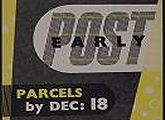Jack Pritchard (1899-1992)
John Craven (Jack) Pritchard was born in Hampstead, and educated at Oundle School and Pembroke College, Cambridge - where he read engineering and economics, enjoyed a lively social life, met his future wife, Molly Cooke, and soaked up ideas like a sponge. In particular he came under the influence of the educationalist Henry Morris (1889-1961) . On graduating he was recruited by Michelin, and discovered scientific management.
After a varied and somewhat restless early career chiefly in advertising, and with a family to support, he joined Venesta, specialists in the manufacture of plywood goods, as a marketing manager. It was first through Venesta that Jack began to promote modernist design. Then in 1930, with the architect Wells Coates, he formed the nucleus of a company that was to become synonymous with the modern style - Isokon Ltd. Jack remained with Venesta until 1936 and then resigned to devote all his energies to Isokon.
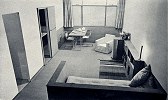

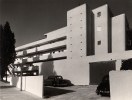
Lawn Road Flats ad image reproduced by permission of Estate of John Craven Pritchard.
Photo of Lawn Road Flats copyright © Pyroc.
Wells Coates designed the Lawn Road Flats for Isokon in 1934. Number 32, the penthouse, was to be Jack and Molly Pritchard's home until the flats were sold in the mid-1960s. Their children, Jonathan and Jeremy, with their nanny, occupied adjoining apartments on the floor below.
Isokon commissioned designs from various designers: Walter Gropius and Marcel Breuer - for whom Jack had found asylum and employment in England - designed furniture for the company, Breuer's Long Chair becoming a true classic. Gerald Summers designed a beautiful and unusual little tea-trolley, and Egon Riss the sculptural Gull shelf and the curvy bookcase-cum-magazine rack nicknamed the 'Donkey'.
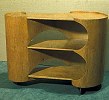
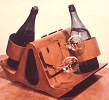
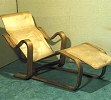
Photographs © University of East Anglia
World War Two all but killed off Isokon's furniture subsidiary, but it was revived in 1963. The revival was short-lived but revealed that there was still a market for the long chair, and for the Donkey. The latter, designed to hold Penguin editions, was re-designed to suit 1960s tastes by Ernest Race. Production of both pieces continued under the auspices of first John Allan Designs and then Windmill Furniture. Windmill's owners, Chris and Lone McCourt, have since expanded the Isokon range under the name Isokon Plus and now produce, in addition to the long chair and the Donkey in its original curvy form, most of the other products in the original Isokon range.
Between 1945 and 1963, Jack Pritchard devoted himself to improving the quality of both the design and manufacture of furniture in Britain, eventually becoming Director of the Furniture Development Council. He was also in demand as a lecturer, an activity that has bequeathed to his archive a fine collection of 35mm slides. Flats and furniture were not Jack Pritchard's only interests. He took a keen interest in economics and politics and was a founder member of Political and Economic Planning, now the think-tank The Policy Studies Institute.
Jack Pritchard died at Blythburgh, Suffolk, in 1992, in the house that his daughter Jennifer and son-in-law Colin Jones had designed for his and Molly's retirement.
Links
- The Pritchard Papers: a guide [University of East Anglia]
- Isokon Plus: includes a history of the Isokon company
- 'Isokon Penguin Donkey' bookcase [Victoria & Albert Museum]
- Lawn Road Flats: [Museum of London]
- Isokon and Blythburg [Blythburg Society]
- From Here to Modernity [Open University]
- Royal Institute of British Architects: Library: Manuscripts & Archives
- Marcel Breuer: A Century of Chairs: Exhibition at the Design Museum, until October 26th, 2003
- Architecture Week: June 20th - 29th, 2003
You can receive regular updates on our special features by joining our mailing list.



